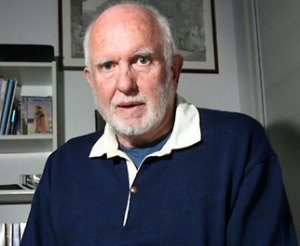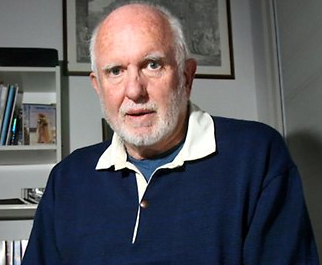I first meet Ray Evans at a dinner at the Institute of Public Affairs. It must have been in about 2004, ten years ago, because I had just seen the movie ‘The Day After Tomorrow’. Staring Dennis Quaid as a paleoclimatologist professor, the movie was about the Gulf Stream shutting down resulting in catastrophic global cooling and a new ice age. 
We were seated at the same table and I mentioned that I had enjoyed the movie, that it had been entertaining. He was scathing of my comment, while admitting he hadn’t seen the movie, and didn’t intend to. He understood that it was themed around advocacy for anthropogenic global warming. Ray was already vehemently opposed to the new doctrine. While he wasn’t keen to discuss the plot of the movie, he was keen to engage me in a discussion of the Gulf Stream.
I think that the next time we meet was at a lunch in Perth, also hosted by the IPA. On that occasion he was scathing of my suggestion that wind turbines could be beautiful. I may have also attempted a defence of wind farms as a source of renewable energy. But was properly put in my place by Ray who had a great depth of knowledge, not only of the economics of wind farming, but also of the quantities of steel and cement used in the construction of each turbine and their associated carbon footprint.
Whenever we met, he always managed to challenge my opinion and impart new knowledge and win the argument.
I now know a lot more about renewable energy, especially after reading an article by Ray full of useful facts and distressing politics published by Quadrant in July 2012 entitled ‘The Ruinous Privileges of Renewable Energy’.
Ray also knew a great deal about bushfires and the politics of control burning in Victoria. When it came to many issues, Ray Evans seemed able to see the wood and the trees and how big the forest was, but he never seemed daunted. Not in the least, and he always seemed to revel in the small facts.
You win arguments by understanding the detail. By forcing your opponent to engage with you on the detail. He once said something like that to me.
Ray stood for enlightenment values from a conservative Christian perspective and seemed to have a deep understanding and knowledge of everything that threatened that ethic.
And he believed you won arguments by getting into the detail. That is perhaps the most useful piece of information that he imparted to me, and by example.
Thank you Ray.


 Jennifer Marohasy BSc PhD is a critical thinker with expertise in the scientific method.
Jennifer Marohasy BSc PhD is a critical thinker with expertise in the scientific method.

Yes, but leaving the facts aside for a moment…
Thanks Jennifer
Ray was a good man and a great advocate for reason and common sense.
I once spoke to Ray Evans on the phone many years ago and later I thought to myself that I wouldn’t like to get on the wrong side of him.
We had a slight disagreement but he happily explained that we did mostly agree, but I needed to lift my game.
He certainly understood about the detail of any issue he tackled and wouldn’t allow you any room for stupid yapping or BS.
RE was right in some respects. The questions are what detail driven by what purpose and how does it fit into some broader context.
How do you get across the detail?
Vale Ray Evans. What a loss to open society debate. One of the early articles
I read by him was ‘ The Lessons of Black Saturday.’ 2009. So much packed
into one six page essay, historical depth, factual detail, political context.
His account of the Greens take over of the stewardship of the forests and
ambitions to combine the bushfire tragedies with their faith in AGW in order
to justify as Evans observed, ‘retooling the economy from top to bottom,’
was a masterly assessment.
Beth the serf.
Apologies once again. Here it is.
http://quadrant.org.au/magazine/2009/07-08/the-lessons-of-black-saturday/
Beth – Thanks for the link to the Quadrant article by Evans. HIs view of Victorian history is interesting if a bit more conspiratorial than seems necessary. I lived in Victoria when Joan Kirner piloted Labor into its crash and burn 1992 election, but was unaware of her earlier purge of the Conservation, Forests and Lands. I do remember how hostile people in the bush were to anyone from the Government though. It was an interesting time to do field work in forest ecology. I liked his dig at the pagan roots of Green philosophy. Sadly, the more lunatic Green fringe would probably relish this interpretation.
I hope his suggested remedy of planting less combustable forests of oaks and other exotic trees was meant to hoist Campbell and the like on the petard of their insane belief that mitigating ‘climate change’ will somehow miraculously prevent bush fires in Victoria. If he was serious, though, it would certainly be a disaster for Victorian wildlife. I am currently reading a novel (Truth, Peter Temple) set in Victoria in bush fire season and one protagonist has planted an oak forest on his property. It will be interesting to see if the oak forest survives.
Will anyone have the courage to fix the electricity pricing mess, before all manufacturing goes offshore ?
Will we return to a position where old people can afford to keep warm ?
Beth, the bushfire paper revives memories and puts sense to half forgotten things. Definitely a man of exquisite detail, Jen
Dave W, you’ve probably read Rhys Jones on aboriginal firestick ‘Farming’
and its affect on Australian landscape.
http://www.aboriginalheritage.tas.gov.au/firestick-farming